Bamboo man of Mizoram
What makes a small landlocked state in India stand out? Chief Minister Zoramthanga has the answer...
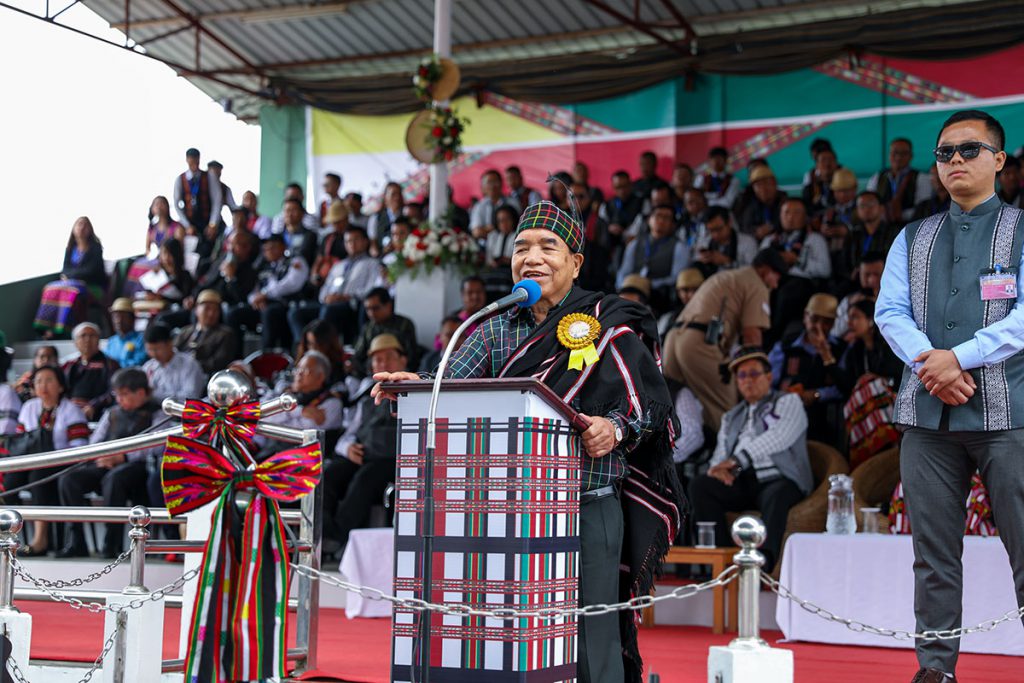
Once dreaded as a leader of the lawless pack, Zoramthanga, the current Chief Minister of Mizoram, is winning hearts for making an inspirational example of Mizoram -- as not just a peaceful state but also a disciplined one.
The images of composed Mizos standing in queues, maintaining social-distance and collecting rations are going viral. These images bear testimony to the fact that he has managed to implement law and order effectively. And with the first Covid-19 patient long recovered, the state as of now is Corona-free, something that the CM is proud of, yet, uncertain about what the future holds.
At the ripe age of 76, Zoramthanga is raring to go like never before. Some locals hail him as a nationalist whose sole ambition is to make the most for his people and resources. And yet, there are differing voices. For instance, there are some who perceive the state’s import of bamboo saplings wasteful, given that over 57 per cent of the geographical area of Mizoram itself is under bamboo cover.
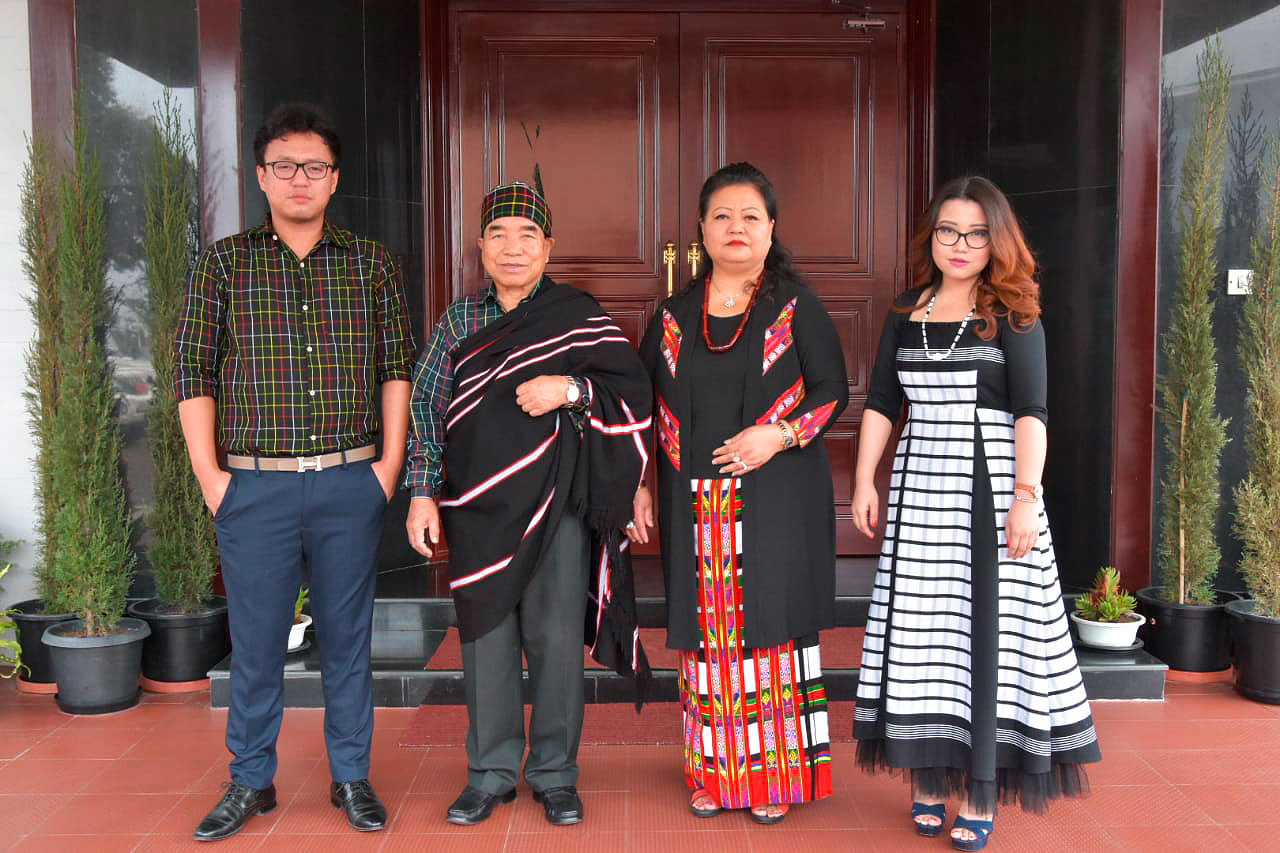
Zoramthanga and his family, his wife Pi Roneihsangi; son Ramthansiama (Siamtea) and daughter Milari (Mimi)
Unperturbed, the man is straddling the fence, juggling the good and bad and concentrating on what he believes is good for all.
A green economic revolution relying on local resources encompasses his vision. And he is quite adamant to do it, especially now, after being on the Opposition for almost a decade. It has been a little over 12 months since he took over the reins from his predecessor and its delivery time.
Fitter than most peers of his age, he is often seen playing badminton at Kulikawn Indoor Stadium, in the southern part of Aizawl and engaging with locals in friendly banters.
His seniors in DM College of Science, Imphal, where he graduated in English Literature, still remember him as a studious boy who could wax eloquent when it came to Shakespeare’s prose.
The former rebel penned his biography “Milari,” four years ago. The name Milari is coined by abbreviating the word “Mizoram,” `Lalpa Remruat leh Kei` which literally means “Mizoram, God`s Will and Me,” and also named after his daughter “Milari.”
The English translation should have hit the market anytime now – had it not been for the lockdown.
The book which sounds nothing short of an action-adventure thriller will have insights on the Mizo rebel group’s arms purchases; his escapades on secret missions to Thailand, Afghanishtan, Iran and Europe, among others.
And of course, his role in the peace talks with the centre government where he was the key initiator under Laldenga, the original radical king of Mizo rebel group, who founded Mizo National Front (MNF) and engaged Zoramthanga as his secretary in the underground movement.
The book will be a tell-tale and that’s something the author feels might make big publishers hesitate to pick it up. He has already been approached by producers in Bollywood for a possible adaptation into a movie. He is also hoping for an inroad to Hollywood.
Zoramthanga held the top job for two terms between 1998 and 2008, but this time, the leader is determined to deliver his promise to the Mizos. He tells Hoihnu Hauzel, what makes it easy to man a state like Mizoram, to overcome the challenges and shares his vision on “economic revolution” for his people.
You inherited a rather peaceful state. How do you ensure continuity in that exemplary discipline in your state, especially at a time of pandemic like this?
By nature, Mizo community is a much regimented society. Since time immemorial, every local community inside Aizawl, have loudspeakers which are controlled by Young Mizo Association or YMA (an impactful community organisation committed to the welfare of the society and, much more) and they make all the announcements concerning disciplinary actions in the society. For instance, announcement of deaths, funerals and important and urgent matters that concern the community are made periodically almost akin to an Army headquarter Battalion. So, when rations are distributed, announcements are made and accordingly people take turns to get their share of the ration. It ensures a seamless exercise during the lockdown phases. Even when people were gathering in more than the permitted numbers, announcements would be made requesting for their dispersal. This system helps us maintain and monitor the society.
Also, Mizo people are very religious minded. And I credit the church for having an important hand in building that. In every committee, we include the church and YMA and that is how we are able to get collective help from students union as well as NGOs.
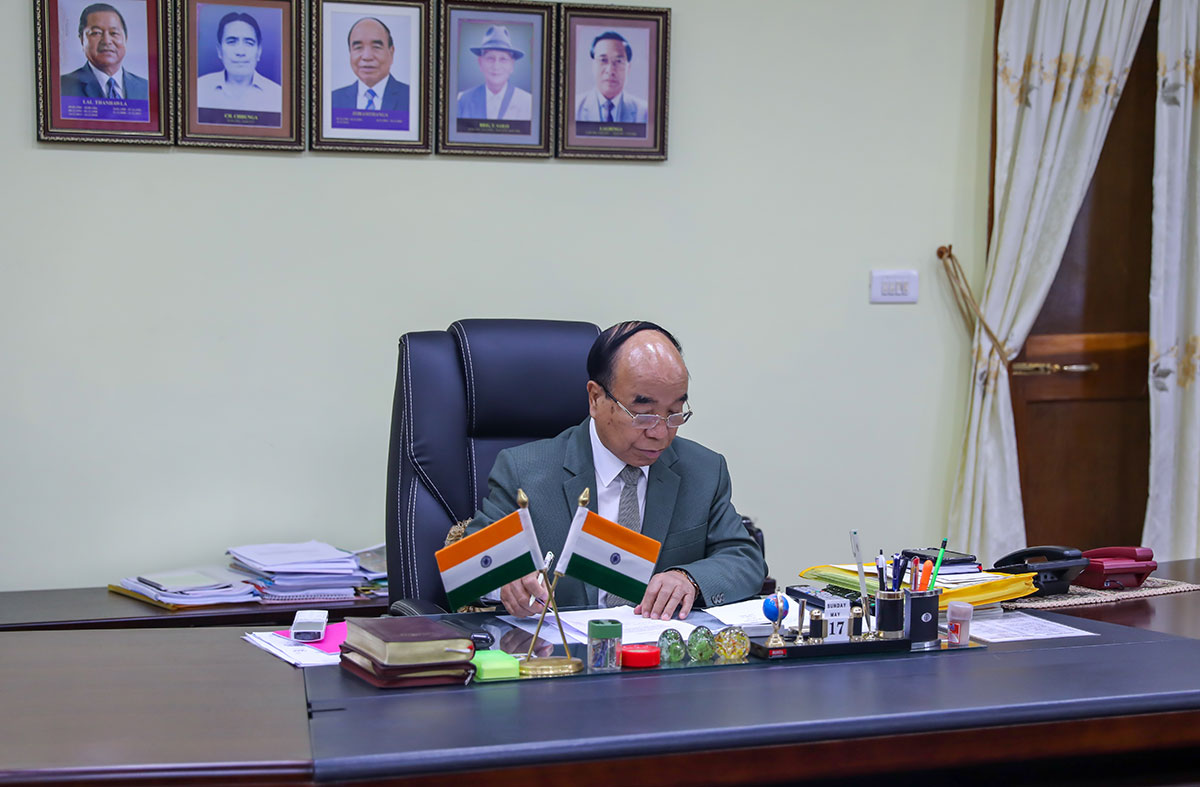
The Chief Minister says he would do what it takes to revolutionise the state economy
How will the state deal with Mizos who are returning home from some hotspots?
We had one Covid patient (a 50-yer-old man) who returned from the Netherland on March 16th. He suffered for more than a month during his quarantine period. Thankfully, he recovered and now we are lucky to be able to say we are Covid-free as of now. But God knows when it will come up as thousands of people will be returning back from the hotspots so anything can happen, anytime. The good part is, our churches help in operating as quarantine centres. In most churches of Mizoram, there are halls almost as big as the church itself. These halls are venues for our feasts during occasions like Christmas and New Year. And they are equipped with all facilities like utensils, cooking materials, water and everything that one may need during shelter. We have asked the Churches to give these venues as quarantine centres and they have agreed. It would be a good arrangement as we plan to quarantine those stranded young Mizos once they arrive home. Inside Mizoram, we do not need much supervision to monitor unnecessary movements as people are quite conscious of what is to be done at times like this.
But I am concern about the borders areas where we share borders with Myanmar, Bangladesh and Manipur. BSF forces are active in the Bangladesh border while Assam Rifles man the Myanmar border. Still, they have to be strengthened and reinforced. So, we have thousands of local volunteers who are on duty for a month now, and will continue to be vigilant there.
Are you sprucing up the airport during lockdown? What is your plan with regard to better connectivity?
I look after the General Administration Department (GAD) and the airport is the only state airport owned by a state government. All the state airports in the country are run by the Airport Authority of India except for Aizawl which has a unique distinction of running its own airport. And I look after it personally like it is my blue-eyed boy. I am involved in every aspect of it, be it repairing and strengthening of the runway. Lockdown period is quiet and most convenient for us to resume the repair and sprucing up work with no disturbance hence, work is on in full swing. I have made many visits to the airport during this lockdown and people have made a joke out of my visits. They feel that I visit the airport too many times. Once we spruce up the airport, we would like to introduce new flight sectors – (all the direct flights out of Aizawl stopped after King Fisher and Jet Airways withdrew) but God knows what will happen post Covid and it is very unpredictable. We definitely like to enlarge and increase flights from Aizawl to other states.
Bamboo is your pet project; how can you leverage this home-grown produce?
My biggest concern is to make Mizoram attain a state of food sufficiency which is well within our capacity. Given that Mizoram has more than 70,000 hectares of cultivable land, this is an attainable goal. If we cultivate rice we can feed at least three times the present population. My target therefore is to attain food sufficiency in the form of local produce like rice, vegetables and grains. In the context of economy, we are land rich and we want to focus on bamboo plantation and there is a huge potential prospect. If we plant bamboo, we can generate an annual income per family to be in the tune of 5 to 10 lakhs. Therefore, I am planning to revolutionise Mizoram economy by means of bamboo cultivation. But we need better means of communication as it is a hilly area. Even though we have a lot of bamboos we cannot do it alone. It is heavy and we have to build roads and when we do that together as a state, we can process them and, processing is quite simple. We then market it at the total substitute of timber. Bamboo is eco-friendly and a good alternative to make paper and clothing. It is really a dream.
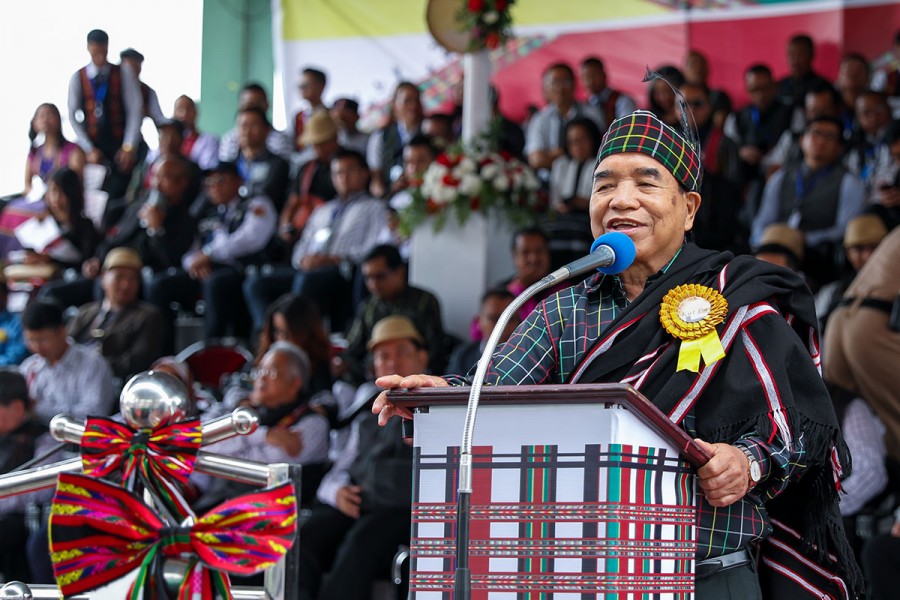
CM Zoramthanga is known for his oratory skill, seen here addressing his fellow Mizos
In the context of Look East and now, Act East, where do you see Mizoram fitting in that scheme?
Mizoram has a very strategic and convenient location as far as Act East policy goes. If you look at our neighbouring state, Manipur, for instance, there are far too many underground outfits to disturb the flowing out and coming in of goods from the East. There are countless taxation run by underground outfits and people like to avoid that. Contrary to that, Mizoram has no such elements and hence, there is no question of collecting donations or taxations here. That itself put us in the right perspective to leverage our standing. But at the same time, we want to be a little cautious and careful as we do not want to be a conduit of drug trafficking which we are really afraid of. So we have to have a limitation in that and that calls for a very balanced approach on our part.
Despite being a dry state so many people die of drinking – could you comment?
Down there across the border, there are liquor shops in Silchar, which is approximately 121 kms from Aizawl. We can only check at duty posts and borders. But comparing with the previous regime, drinking and its ill effects of alcoholism is on the wane drastically and, it will further come down to at least 30 per cent. We cannot eliminate it all together completely though. Earlier, whenever there were instances of death caused by alcohol the average age was between 24 to 34, now the figure is showing some sign of improvement. Earlier, everything was easy; everything was free just like in the United States. The laxed attitude helped in disseminating not only HIV but different kinds of anti social practises. Now, with the fear of Covid-19, discipline becomes a-must in the state.
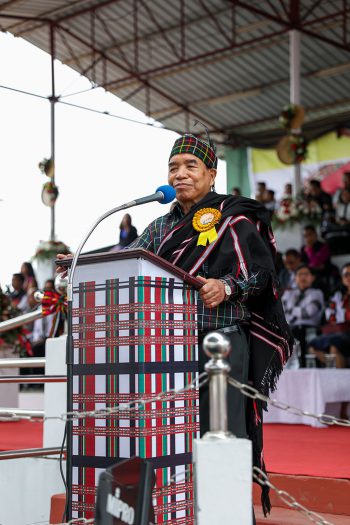
CM Zoramthanga is known for his oratory skill, seen here addressing his fellow Mizos
How do you plan to revolutionise the economy of Mizoram?
My approach of economic development is quite simple and straightforward. I want to thrust on primary economic sector. If we take the example of bigger states like Gujarat, people suffer economically because most of them are employees. Their main source of income is employment generated by big industries and activating the industry could be difficult there. But in Mizoram, I would like to do the other way round. I want to thrust on primary economic sector to optimise on what we have locally and this has the capacity to feed two to three times the present population. We will focus on locally available products like rice and bamboo. We will produce in the land, process it locally and market it outside. I want the state to yield the benefit of primary economy. On the contrary, big states like Gujarat cannot do that, as everything is controlled by big industries. So my intention is to make majority of people stakeholders or employees and boost their economic power. The main economy will be originating from the land itself. If you are going to manufacture and import the raw materials from outside and value add it, and process it here and sell it out again ---in a state like Mizoram where our location is a big challenge, it would be an unprofitable proposition.
I once candidly told our PM that it is my vision to make Mizoram self-sufficient in food and one of the best per capita incomes in India. I like to revolutionise the economy.
What is the scope for outside investors and collaboration?
Of course, as a state, we are also keen to have outside investment and collaboration. We will be open to invite people to come and invest but all along my intention is economy based on the product of the land. Also, processing based on the product of the land and marketing the processed goods of the land is what I am looking.
The young population needs Information Technology – how will you strengthen its presence in your state?
That has to be promoted because we are a state with the highest literacy rate. IT and all kinds of new IT development present in the current generation will have to be taken into our realm of development. The new generation or, the younger people are very interested in Information & Technology which I believe can generate a lot of employment.
What are your thoughts on Hindi as a national language in a non-Hindi speaking state like Mizoram?
As far as Mizoram is concerned, we like to learn Hindi. I said it all along and, learning any language is good, whether that includes foreign language or otherwise. If anybody can learn Hindi, it is good, I would encourage it. My disadvantage in not knowing Hindi became very pertinent during a recent Chief Ministers meeting with the PM. It so happened that, me along with the Nagaland CM, were the only two CMs who could not speak Hindi and it is quite a problem. Another instance, when we recently had a North East Democratic Alliance or NEDA meeting in Guwahati, Amit Shah was giving a powerful speech in Hindi. He was praised for his action in Kashmir. At the end of the meeting I told him, “Amitji, you delivered such a powerful speech and a strong one but the problem is that I do not understand even a word.” It is indeed a very problematic not knowing Hindi. Other CMs asked the central government to give a sanction for Hindi teachers in the state education. As for my state, Hindi is taught whenever there is a Hindi teacher who is from the state itself.
What is your fitness regime?
Previously I used to play badminton but now I cannot continue due to the lockdown. Now, in my house I continue to exercise by doing cross-trainer for about 40 minutes to an hour. Previously during the rigid lockdown period when nothing could be done, I sat and read the Bible. I read the entire scripture once again. That’s food for the soul.

